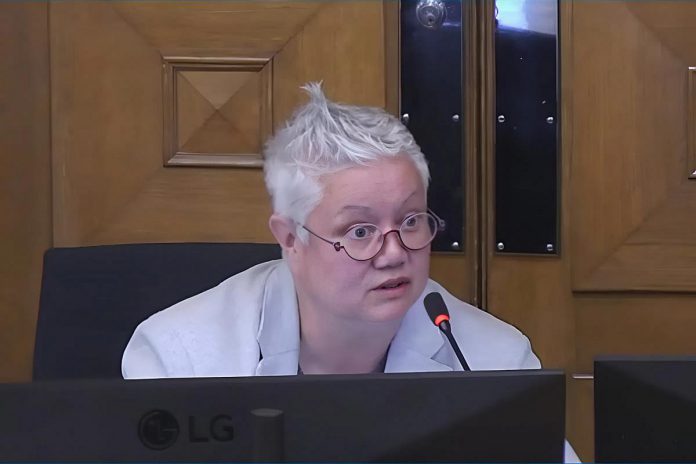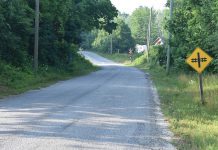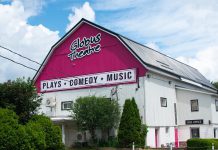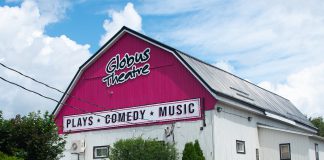
The use of a procedural tactic to prevent debate at Peterborough city council was front and centre during a brief council meeting early Tuesday evening (November 4).
Council was meeting to endorse a decision made at general committee the previous afternoon to reject a recommendation from the city’s heritage committee that several buildings at the General Electric factory complex be designated under the Ontario Heritage Act in addition to those council approved at its October 14 meeting.
As was the case at the general committee meeting, the matter was dealt with in less than 10 minutes and with no debate after a councillor called the question — a procedural tactic that ends debate and, if supported by a majority of councillors, forces an immediate vote.
At Monday afternoon’s general committee meeting, councillor Dave Haacke called the question. At Tuesday evening’s council meeting, it was councillor Gary Baldwin who did so. In both cases, the councillors called the question before any other councillors had the opportunity to speak to the motion.
A motion to call the question comes from Robert’s Rules of Order, first published by U.S. Army engineer Henry Martyn Robert in 1876 based on traditions of the British Parliament and the U.S. House of Representatives, but simplified and standardized to make them practical for ordinary organizations to conduct meetings fairly and efficiently.
In Robert’s Rules of Order, calling the question (formally known as “the previous question”) is a motion used to end debate and proceed immediately to a vote on the pending motion, but only if the motion to call the question is seconded by another member and approved by a two-thirds vote.
Peterborough city council meetings are governed by the city’s procedure by-law which, although it draws upon Robert’s Rules of Order, does not follow them verbatim. For example, the city’s procedure by-law does not specify whether a motion to call the question must be seconded by another councillor and requires a two-thirds vote — although the by-law does state that Robert’s Rules of Order should be used for guidance in “all unprovided cases.”
At Tuesday’s city council meeting, councillor Baldwin called the question immediately after the general committee motion was moved and seconded.
Councillor Joy Lachica raised a point of order and asked Mayor Jeff Leal, who was chairing the meeting, if a seconder was not required for a motion to call the question.
“It hasn’t been the practice here,” the mayor replied, after checking with the city clerk.
On a second point of order, councillor Lachica said “It’s a shame that we can’t respect all of the voices to discuss such an important issue,” referring to councillors being able to reflect the wishes of the electorate.
Councillor Baldwin then raised a point of order, saying he took exception to councillor Lachica’s comment.
“I think she’s calling into question my integrity,” he said. “This is a practice that we’ve had here at city council since I’ve been a councillor. I don’t think by me moving that the question be put that I should be disrespected.”
On her third point of order, councillor Lachica explained her objection to how calling the question is being used.
“Robert’s Rules of Order speak to calling a question when those who have wished to speak have been given the opportunity and were sawing sawdust,” she said. “There’s no direct person that I’m speaking to, but what’s being observed is that this is an obstruction to the democratic voice of council and it’s being weaponized.”
Before proceeding to the vote on councillor Baldwin’s motion, Mayor Leal told councillor Lachica that a new procedure by-law would be coming forward “and if you want to make changes then, we’ll make them.”
Council then voted on the motion to call the question, which passed 6-4 with Mayor Leal and councillors Baldwin, Don Vassiliadis, Dave Haacke, Andrew Beamer, and Lesley Parnell voting in favour and councillors Lachica, Alex Bierk, Matt Crowley, and Keith Riel voting against. Councillor Kevin Duguay was absent from the meeting.
The vote on the main motion — that council endorse the general committee decision to retain the heritage designations for GE buildings that it had approved at its October 14 meeting — passed 7-3, with councillors Lachica, Bierk, and Riel voting against it (the recorded vote was 8-2, but Riel had inadvertently voted in favour and, on a point of order, asked that his vote be changed).
In an apparent protest on the use of calling the question, councillor Lachica also voted against the by-law to confirm the proceedings of the meeting and the motion to adjourn the meeting — votes that are usually unanimous.

























